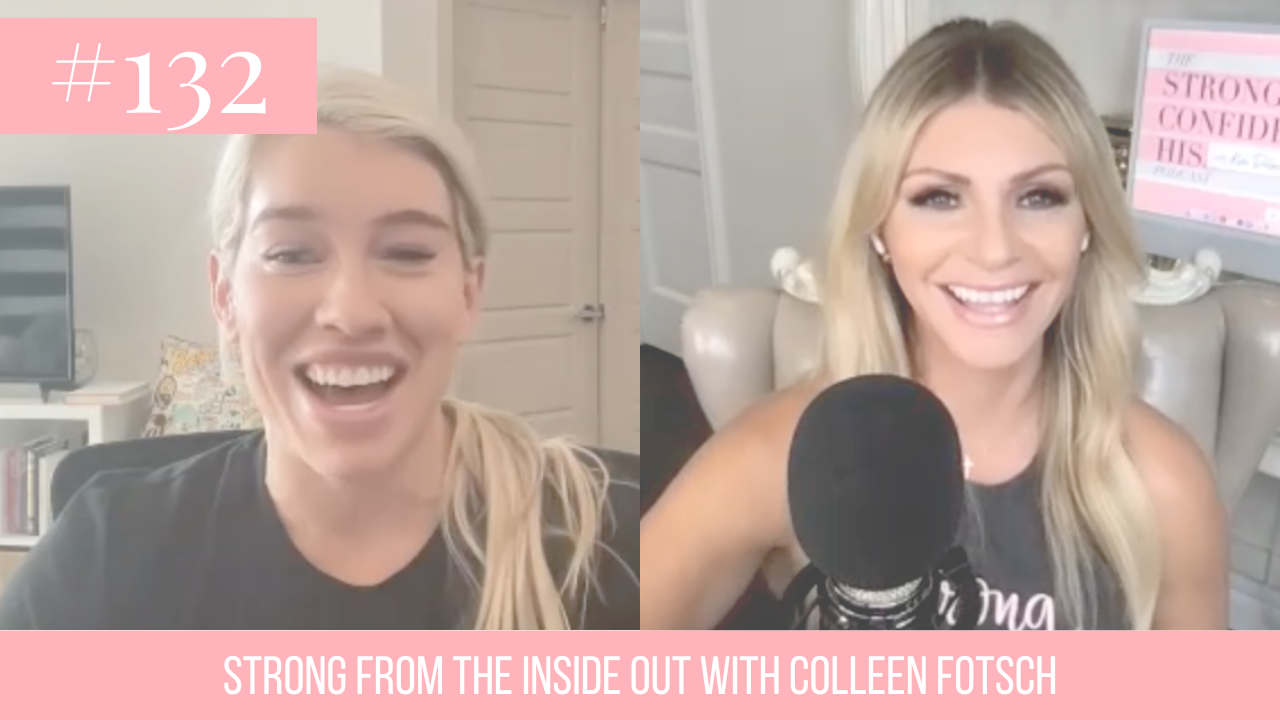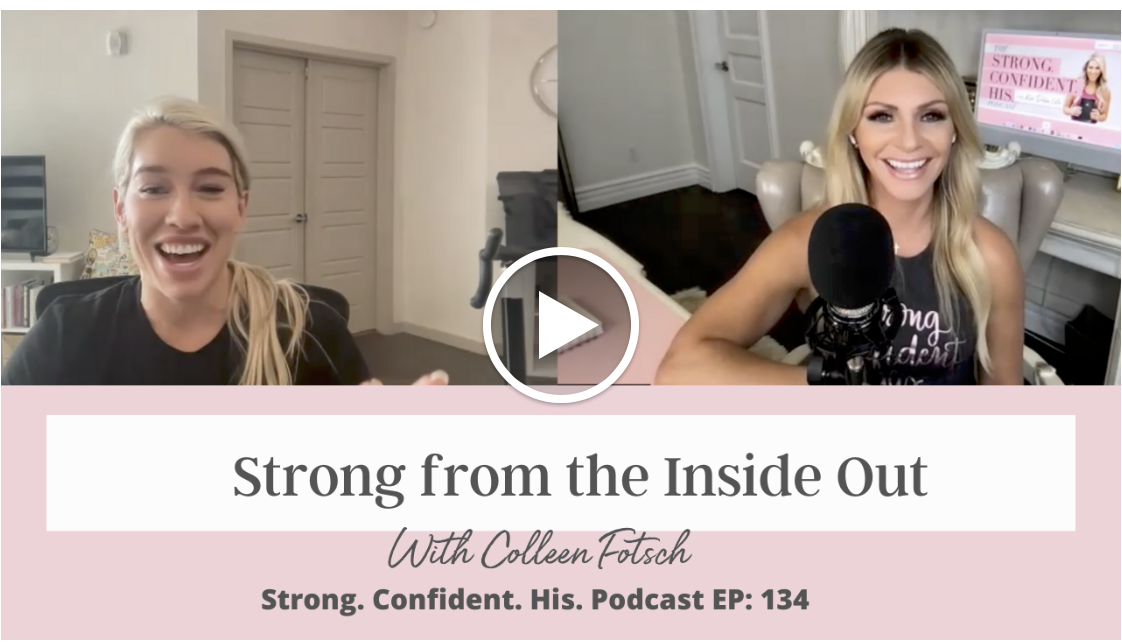Strong From the Inside Out with Colleen Fotsch

Hey, sisters in Christ, I recently interviewed Colleen Fotsch. She literally is the embodiment of Strong. Confident. His.
She's a data analyst and a five-time all-American swimmer at UC Berkeley, where her team won many championships, and after college, Colleen got into CrossFit. She competed at the games and the regional regionals multiple times as both an individual athlete and in the team division, and she had a first-place finish in the 15.5 where she was the fastest woman in the world.
In 2020. Colleen was also recruited to join the USA Bobsled team. She’s been an athlete all her life, but she has her own struggles too.
Can you please share a little bit about your struggles and your journey for those of us who don't know you?
“Yeah, absolutely. I've had two major injuries. I had a torn rotator cuff from just overuse from swimming, which I didn't get surgery on or didn't know was torn until I was midway through my CrossFit career. And that kind of led to me going team in CrossFit, which was like one of the coolest things ever got to just be around a bunch of amazing people and got to be on the team with now one of my best friends, Molly, and so that was super cool. And then about like a year, like a year in two months ago, I tore my ACL, which was super not fun.
This was the first acute injury I've ever had, everything else was like tweaks and stuff here and there. This one was different because I feel like it kind of shook me mentally a little bit because you start just to feel a little more fragile. And not that I felt totally invincible before, but you kind of do at certain points like you just you aren't worried about it.
After that injury, it took me a while to just push myself again in certain ways without fear of hurting myself again, to be honest, which I mean with any injury. on any level, it's equal parts physical and mental. I would say like the mental part of coming back from any injury is, I think, way harder than the physical part. But, but yeah, so those were out of like, my athletic career was like my two main biggest setbacks for sure.”
Can you explain what you meant by, “You're entitled to nothing?”
“Absolutely! I was training to make it to the CrossFit Games for a long time individually. So I'd gone team. I was working my butt off and dialing in my nutrition, my sleep; I was training twice a day, five times a week leading up to the games, it was like three days, sometimes, you know, I was, I felt like I was doing everything in anything, I could, in my control, to set myself up for success. And to make a long story short, that year in the games, they really switched up just the format of the games.
So it was super different than any year in the past. I felt almost cheated by it because I felt like it was unfair, and all these things and, and it took me a bit to like to be at peace with it. But I realized that there was a sense of entitlement there like; I felt because I had worked so hard and put in all this time that, I was entitled to get the experience I was envisioning for myself. And I think it was kind of a hard pill to swallow at the time. Like that, you can work your butt off and do all this stuff, and it sometimes doesn't pan out exactly how you want it to. And that's okay. And a lot of times that's, it's, you know, it isn't God's plan for it to work out that way.
Even though, at the time didn't understand that, I think that it allowed me to lean more into my faith, I also think that when it comes to like, Fitness, Health, and stuff, it's got to be about the journey.”
Prefer to Watch The Video, Join Us, Click Below.
You also have a master’s degree - let’s talk about that!
“So when I was deciding to go back to get my masters, I got my masters in Kinesiology, I remember having conversations with my dad being like, I can't do this like I can't, I was training full time to be a Games athlete. I even had people in my life being like, well, if you go back to school, you're not going to be successful or as successful as you want to be, you know, as an athlete. I wanted to be great at both of them.
I definitely struggled a bit. But the coolest thing was when I found out that I qualified to go to the games, and I had just, like, Aced a class in my master's. And I was like, yeah, like I did that.”
How did you navigate identity and body image?
"I would say CrossFit, and really, I mean, CrossFit changed my life in so many ways, and it really did help me with body image and embracing, being strong, having muscle, and having an athletic build. It's something that I think about even now, like transitioning out of competing, it's something that, like, I still struggle with because I now look back at photos of when I was competing in CrossFit, and I look so different now.
You just can't, whether it's comparing to other people or comparing to another version of yourself, it's just not a good place to be in. And I think, I think all of it ties back to like being very present and focusing on just now. And I think for me, now, I mean, kinda had to backtrack on the body image thing. So CrossFit really helped me especially out of, because when I was in college, I definitely had a pretty negative sense of body image, I was like, I just want to be super tiny. "
You have to be physically and mentally strong!
“When I was coming out of college, I didn't want to be quote unquote, you know, big, I didn't want to lift too much weight, but I loved lifting. Like I remember in college, we didn't do a lot of Olympic lifting, but we did some clean poles. And it's hard to describe the sense of like the feeling that I would get when I was lifting that kind of weight. And as funny as it sounds, I felt so at home, like and I and I felt it was like my little arena to like really express myself and push myself.
The reason I got into CrossFit was I loved lifting, and I wanted to lift more. And it was the first time in a while I had gone to walk into a gym, and it was more about what I could do. And I was like, I'm just trying to lift this thing. I'm trying to do this new skill. It wasn't like so fixated on what I was trying to make my body look like or anything like that.”
What would you tell someone who wants to get strong? Where should they start?
“Start with choosing a program that has some sort of resistance training. But also, you've got to enjoy it to some respect. Also just taking it one day at a time, like I think starting with again, choosing a program and a schedule that, you know you can stick to.”
Do you work out now?
“Yeah, four days a week. Occasionally, a fifth day, like, depending on the week. And it is pretty crazy how, like, if work starts to get nuts. And I mean, I like to keep the split like I go Monday, Tuesday, Thursday, Friday, occasionally Saturday, we're like, I'll save like a really big day for Saturday.
I definitely don't work out the same way I used to because I wouldn't be able to function at work. And like, workouts can still be hard, and I like a challenge and to be pushed, but I also need them to kind of like revive me more than like, you know, beat me down kind of thing.”
Looking Back to See God Working
Sometimes when we look back, we can see how God was working. But talk about how when you went to train for the bobsledding team, what happened? And who did you meet? Like, talk about that? Because I feel like sometimes we look at the setbacks. And we're like, my life is over. But it's not. So can you share what happened?
“It's so tough too because yeah, like it's, and I think that's the importance of faith, like knowing that one that you don't need to have all the answers right now. And some answers you may never get, but like you'll, but it's all part of the plan. And yeah, so basically, and it's kind of funny how me having my not-so-great experience at the Games kind of also led me even to try bobsledding because, you know, I can sit here and play the what if games all day, but I do think if, let's say, you know, the games went amazing. And I was like, you know, towards the top and it was exactly what I wanted it to be. I don't know if I would have wanted to, you know, leave to try another sport. Right. And so I ended up going to trial for the bobsled team. I ended up meeting my now boyfriend. And like, never in a million years. But I think like, and that's the thing is like, I'm like if, if that's what, you know, came out of this whole experience, even with so I guess I should backtrack.
I met my boyfriend when we were in the weight room at the Olympic Training Center. We were both on the team. And my goal was to qualify for the national team. And then the next goal was the following season. I wanted to try out for the Olympic team. And I think it was like I had just gotten approved to have housing at the Olympic Training Center. When I went to it was the first time I was visiting my boyfriend like in his hometown. I was going to meet his family and like all his friends and yeah, I was so excited.”
Is there anything that you want to leave people with?
“The most important thing, all of it, like that's where our identity lies. Like that's what I truly believe in. And I think more than anything, regardless of what chapter you are in your life, be present. Because all of I think when we feel overwhelmed, anxious stuff that's all coming from just not like being like in the here and now. And I say that knowing that I need to take that advice myself many times”
Faith fuel.
“I appeal to you, therefore, brethren, by the mercies of God to present your body as a living sacrifice holy and acceptable that's acceptable to God.” Romans 12:1
Thank you so much for joining us, friends. Remember that you are Strong. Confident. His!




